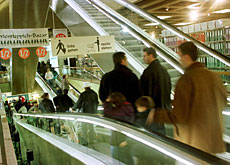
Switzerland seen as top test market for Europe

American businesses are being advised to use Switzerland as a test market for products they intend to try and sell in Europe.
In its latest survey of export markets, the US department of trade rates Switzerland above most of its neighbours as a place to do business.
The US department of trade’s Country Commercial Guide (CCG) describes Switzerland as “an excellent test market for businesses hoping to introduce new products to Europe”.
It cites the country’s highly developed, multilingual market, its location in the middle of Europe, and its well-educated and affluent population.
The advice is not news to at least two American companies – McDonalds and Starbucks – which have already used Switzerland as a test bed for planned overseas expansion.
The coffee chain, Starbucks, opened its first European outlet in Zurich in March last year.
Lessons from the Swiss market
Mark McKeon, President of Starbucks Europe, Middle East and Africa, said at the time that Switzerland had been chosen because “The lessons drawn from the Swiss market can be applied across Europe”.
Last year also saw the fast-food chain, McDonalds, open its first Golden Arch hotels in Switzerland. The idea was the brainchild of Urs Hammer, chief executive of McDonalds Switzerland, and marked the group’s first foray into the hotel business.
Martin Huber, chief financial officer of McDonalds Switzerland said the country had been chosen because of its “strong tradition in the hotel business [and that] the success or failure of the Swiss hotels would determine whether to expand into other places.
A key strength of Switzerland, in the US trade department’s view, is local companies’ marketing expertise in much of the world, including eastern Europe, the Far East, Africa and the Middle East.
Thumbs up for investment
The CCG gives Switzerland the thumbs up as a place for foreign firms to invest. It says the country has liberal trade and investment policies, as well as a highly developed legal system, which “protect[s] investments”.
A skilled workforce, “laws promoting labour flexibility”, and the absence of labour unrest are also given a strong endorsement, as is the quality and precision of the machinery, metals, electronics and chemical industries.
Switzerland is clearly seen as a better place to invest than many of its neighbours. The CCG for Germany, for example, warns US investors to “closely study the bottom line before buying into Germany or expanding their position”.
Bureaucratic
It says they can count on high levels of productivity and a highly skilled labour force, but advises that “Germany’s regulations and bureaucratic procedures… can prove a baffling maze [and that] government regulation is often complex and may offer a degree of protection to already-established local suppliers”.
France gets a more positive assessment, but the CCG urges companies to take note of high taxes and the 35-hour working week introduced by the former Socialist government.
The only “negative” observations the CCG makes about Switzerland concern the agricultural sector. Switzerland’s farmers, the guide says, are among the world’s most protected and most highly subsidised.
The Americans hope however that the application of World Trade Organisation rules will eventually improve the situation for importers.
Other benefits
The CCG listed a plethora of other advantages for firms doing business in Switzerland, not least the buying power of the population.
The Swiss earn on average the world’s highest salaries, the guide points out, and levels of education and medical care are also of a high standard.
Switzerland also has one of the world’s highest per capita ownerships of personal computers, and the Swiss have well and truly taken to the Internet. The country is also addicted to insurance cover and expensive health care rates.
Trading bonus
The guide suggests that trade has been the key to Swiss prosperity over the years, despite a period of stagnation that lasted most of the 1990s.
Export markets are needed to generate income, while imports are required to make up for a lack of raw materials. The report said however that just four sectors – machinery, metals, electronics and chemicals – accounted for over half of Switzerland’s exports.
The strong Swiss franc, and the high standards of the Swiss financial sector were also seen as positive factors.
Finally, the guide points out that the Swiss are extremely active in the tourism sector. Not only is Switzerland’s tourist infrastructure well developed but the Swiss themselves are tireless travellers.
Because of this, they have been important contributors to the success of the US tourism industry over the years. In 2000, more than 400,000 Swiss citizens travelled to the US. Their custom brought almost $2 billion to the US economy.
swissinfo
Starbucks and McDonalds have already used Switzerland as a test bed for planned overseas expansion.
The report says Switzerland is a attractive for investment because of its location in the middle of Europe, and its well-educated and affluent population.
The country’s liberal trade and investment policies, as well as a legal system, which “protect[s] investments” are also seen as key advantages.
Switzerland is seen as being more accommodating to foreign investment than many of its neighbours, such as Germany and France.

In compliance with the JTI standards
More: SWI swissinfo.ch certified by the Journalism Trust Initiative

























You can find an overview of ongoing debates with our journalists here . Please join us!
If you want to start a conversation about a topic raised in this article or want to report factual errors, email us at english@swissinfo.ch.